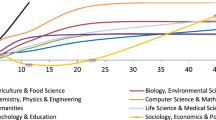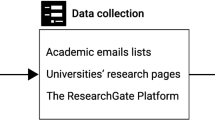Abstract
Comparing research output of foreign-trained doctorates (returnee PhDs) with those trained in the home country allows us to test effects of scientists’ mobility on research productivity, and informs policies aimed towards incentivizing return of foreign-trained scientists. This study compared research output of returnee PhDs in three fields that vary in resource-dependency (social sciences, sciences, and engineering), factoring in seniority and gender. Scientometric analysis (n = 1056) compared research outputs of returnee PhDs & home-PhDs (h-Index and citations) at three levels of seniority (assistant, associate, professor) in the three fields. The comparison suggests that on average (independent of field), research output of returnee PhDs does not exceed that of home-PhDs, however, returnee PhD research output compared to that of home-PhDs in the sciences is substantially low compared to the difference in output observed in the social sciences and engineering fields. In sciences field, returnee PhDs’ output is lower than that of home-PhD at all three academic positions, whereas in the engineering field, returnee PhDs at the starting and senior-most positions show greater research productivity than home-PhDs. In social sciences, returnee PhDs’ research output exceeds that of home-PhDs only at the senior most position. Regarding gender, the analysis shows that research output of female returnee PhDs in the engineering field, in spite of them being small in number, is higher than that of male returnee PhDs. Implications of these insights are discussed to inform policies aimed toward incentivizing return of foreign PhDs to developing countries.


Similar content being viewed by others
References
Abramo, G., D’Angelo, C. A., & Di Costa, F. (2011). Research productivity: Are higher academic ranks more productive than lower ones? Scientometrics, 88(3), 915–928.
Anderson, J. R., Reder, L. M., & Simon, H. A. (1996). Situated learning and education. Educational Researcher, 25(4), 5–11.
Aslanbeigui, N., & Montecinos, V. (1998). Foreign students in US doctoral programs. The Journal of Economic Perspectives, 12, 171–182.
Bar-Haim, G., & Wilkes, J. M. (1989). A cognitive interpretation of the marginality and underrepresentation of women in science. The Journal of Higher Education, 60(4), 371–387.
Barnett, S. M., & Ceci, S. J. (2002). When and where do we apply what we learn? A taxonomy for far transfer. Psychological Bulletin, 128(4), 612.
Bøgelund, P., & de Graaff, E. (2015). The road to become a legitimate scholar: A case study of international PhD students in science and engineering. International Journal of Doctoral Studies, 10, 519–532. http://ijds.org/Volume10/IJDSv10p519-533Bogelund2013.pdf. Accessed 12 Oct 2016.
Borjas, G. J. (2006). Immigration in high-skill labor markets: The impact of foreign students on the earnings of doctorates (Vol. 12085). Cambridge: National Bureau of Economic Research.
Brodin, E. M. (2016). Critical and creative thinking nexus: Learning experiences of doctoral students. Studies in Higher Education, 41, 971–989.
Brown, J. S., Collins, A., & Duguid, P. (1989). Situated cognition and the culture of learning. Educational Researcher, 18, 32–42.
Chandrasekharan, S., & Nersessian, N. J. (2015). Building cognition: The construction of computational representations for scientific discovery. Cognitive Science, 39(8), 1727–1763.
Cole, J. R., & Zuckerman, H. (1984). The productivity puzzle. Advances in motivation and achievement. Women in Science. Greenwich, CT: JAI Press.
Cowley, S. J. (2015). How peer-review constrains cognition: On the frontline in the knowledge sector. Frontiers in Psychology, 6, 1706. https://doi.org/10.3389/fpsyg.2015.01706.
Dunbar, K. (2001). What scientific thinking reveals about the nature of cognition. Designing for science: Implications from Everyday, Classroom, and Professional Settings, 115–140.
Elsevier, B. V. (2012). International comparative performance of India’s scientific research. India: Report commissioned by the Department of Science and Technology (DST).
Fox, M. F. (1983). Publication productivity among scientists: A critical review. Social Studies of Science, 13(2), 285–305.
Fox, K. J., & Milbourne, R. (2006). Is it harder to soar with eagles when you work with turkeys? Australian Economic Papers, 45, 362–371.
Franzoni, C., Scellato, G., & Stephan, P. (2012). Foreign-born scientists: Mobility patterns for 16 countries. Nature Biotechnology, 30(12), 1250.
Garfield, E. (1970). Citation indexing for studying science. Nature, 227(5259), 669–671.
Greeno, J. G. (1997). On claims that answer the wrong questions. Educational Researcher, 26(1), 5–17.
Greeno, J. G., Moore, J. L., & Smith, D. R. (1993). Transfer of situated learning. In D. Detterman & R. J. Sternberg (Eds.), Transfer on trial: Intelligence, cognition, and instruction (pp. 99–167). Norwood, NJ: Ablex.
Gregg, L. W., & Simon, H. A. (1967). Process models and stochastic theories of simple concept formation. Journal of Mathematical Psychology, 4(2), 246–276.
Gupta, B. M., Kumar, S., & Aggarwal, B. S. (1999). A comparision of productivity of male and female scientists of CSIR. Scientometrics, 45(2), 269–289.
Hayes, J. R. (1990). Cognitive processes in creativity. (Paper No. 18). University of California Berkeley.
Heitor, M., Horta, H., & Mendonça, J. (2014). Developing human capital and research capacity: Science policies promoting brain gain. Technological Forecasting and Social Change, 82, 6–22.
Hilmer, C., & Hilmer, M. (2010). Are there gender differences in the job mobility patterns of academic economists? The American Economic Review, 100(2), 353–357.
Hirsch, J. E. (2005). An index to quantify an individual’s scientific research output. Proceedings of the National Academy of Sciences of the United States of America, 102(46), 16569.
Klahr, D., & Dunbar, K. (1988). Dual space search during scientific reasoning. Cognitive Science, 12(1), 1–48.
Lave, J., & Wenger, E. (1991). Situated learning: Legitimate peripheral participation. Cambridge: Cambridge University Press.
Lehman, D. R., Lempert, R. O., & Nisbett, R. E. (1988). The effects of graduate training on reasoning: Formal discipline and thinking about everyday-life events. American Psychologist, 43(6), 431.
Lum, K. (2015). Operationalizing the highly skilled diasporic transnational family: China and India’s transnational governance strategies. Diaspora Studies, 8(1), 51–65.
Mishra, V., & Smyth, R. (2013). Are more senior academics really more research productive than junior academics? Evidence from Australian law schools. Scientometrics, 96(2), 411–425.
Mowbray, S., & Halse, C. (2010). The purpose of the PhD: Theorising the skills acquired by students. Higher Education Research & Development, 29(6), 653–664.
Mullins, G., & Kiley, M. (2002). “It’s a PhD, not a Nobel Prize”: How experienced examiners assess research theses. Studies in Higher Education, 27(4), 369–386.
Nethsinghe, R., & Southcott, J. (2015). A juggling act: Supervisor/candidate partnership in a doctoral thesis by publication. International Journal of Doctoral Studies, 10, 167–185.
Pande, P., & Chandrasekharan, S. (2017). Representational competence: Towards a distributed and embodied cognition account. Studies in Science Education, 53(1), 1–43.
Park, C. (2007). Redefining the doctorate. York: Higher Education Academy.
Ramsden, P. (1994). Describing and explaining research productivity. Higher Education, 28, 207–226.
Roth, W. M., & Lawless, D. (2002). Scientific investigations, metaphorical gestures, and the emergence of abstract scientific concepts. Learning and Instruction, 12, 285–304.
Sahoo, B. K., Singh, R., Mishra, B., & Sankaran, K. (2017). Research productivity in management schools of India during 1968-2015: A directional benefit-of-doubt model analysis. Omega, 66, 118–139.
Simon, H. A. (1977). Scientific discovery and the psychology of problem solving. In Models of discovery (pp. 286–303). Dordrecht: Springer.
Travis, G. D. L., & Collins, H. M. (1991). New light on old boys: Cognitive and institutional particularism in the peer review system. Science, Technology and Human Values, 16(3), 322–341.
Wang, Q., & Sandström, U. (2015). Defining the role of cognitive distance in the peer review process with an explorative study of a grant scheme in infection biology. Research Evaluation, 24(3), 271–281.
Wellington, J. (2013). Searching for ‘doctorateness’. Studies in Higher Education, 38(10), 1490–1503.
Wilson, M. (2002). Six views of embodied cognition. Psychonomic Bulletin & Review, 9, 625–636.
Ziman, J. M. (1968). Public knowledge: An Essay Concerning the Social Dimension of Science. Cambridge: Cambridge University Press.
Author information
Authors and Affiliations
Corresponding author
Rights and permissions
About this article
Cite this article
Singh, V. Comparing research productivity of returnee-PhDs in science, engineering, and the social sciences. Scientometrics 115, 1241–1252 (2018). https://doi.org/10.1007/s11192-018-2706-x
Received:
Published:
Issue Date:
DOI: https://doi.org/10.1007/s11192-018-2706-x




